I got physical against them
author
Vladimír Hučín
Vladimír Hučín had continual conflicts with the communist authorities since his early youth. He had long hair, listened to Western rock music and dreamt of freedom. In the 1970s and 80s, he became increasingly radical: he distributed leaflets criticizing the regime and committed minor acts of arson as well as bomb attacks against communist monuments and party buildings. For this reason, he spent 40 months in prison and was also kept under constant surveillance by the secret service. In 1987, he signed Charter 77, a civic initiative against the human rights violations of the communist tyranny, thus once again publically committing himself to the opposition. Following the Velvet Revolution, the predominantly non-violent change of state systems in Czechoslovakia in 1989, Vladimir fought for eight years for his rehabilitation – ultimately, with success. But even after the fall of the communist regime, Vladimir found no peace and quiet; today, he is still the angry rebel fighting against the authorities and for his rights. For five years (2001-2006) he fought a closed-to-the-public trial, but despite being acquitted he has never received any compensation. In 2006 and 2008, he ran unsuccessfully as a candidate for the Senate.
Postcard
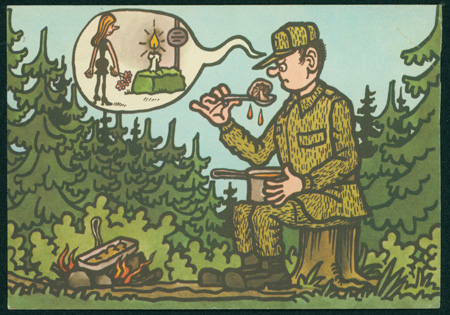
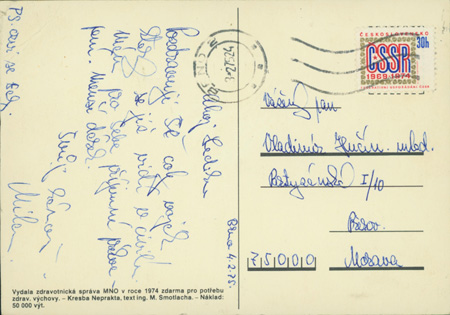
- Postcard Text
- "Hello Ladik. I greet for you As a soldier who has been already picturing himself back in civies. I’ve got a pleasant surprise for you. Such a smaller gift. Your friend Mila."
- 5th anniversary of the Czechoslovak Socialist Republic
- "ČSSR 1969-1974 federativní uspořádání": In 1974, the Czechoslovak Socialist Republic celebrated its 5th anniversary. The most notable result of the reforms that come into force in 1969 was the emancipation of the constituent republic of Slovakia. This political transition arose from the Prague Spring of 1968, which strove for "socialism with a human face".
- A Small Present
- "Menší dárek." A small present – the familiar tone taken by the secret service spy Miloslav "Míla" Jemelka was meant to win the confidence of Vladimír Hučín. Jemelka "stole" ammunition from the military base – the small present that he passed on to Hučín. Hučín used the munitions to disrupt the annual celebration of the October Revolution.
- Brno
- Brno (Brünn) is the second largest city in the Czech Republic, and the location of many of the central institutions of the country (administrative, judicial, industrial and cultural). The city, founded in the 11th century, is characterized by a long and varied history: among the most tragic historical events is the Brno Death March of 1945, during which approx. 27,000 German-speaking citizens were expelled from the city. Under the communist government, Brno became one of the leading industrial cities of the CSSR.
- Příbor
- Příbor (Freiberg) is located on the Lubina River in the northeastern Moravian region of the Czech Republic. The small town plays a special role in Moravia due to its educational institutions, including the Czech Teacher's Institute founded in 1875. Příbor is the birthplace of Sigmund Freud.
personal archives
Vladimír Hučín in the early seventies.
This picture shows Vladimír Hučín in the early seventies.
country: Czechoslovakia / year:
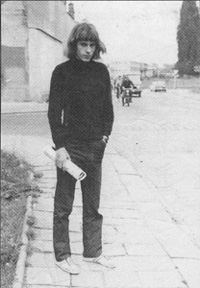
This picture shows Vladimír Hučín in the early seventies. Vladimír was beaten up in Přerov in 1971 because he had long hair and wore a Led Zeppelin t-shirt.
Calm and Storm
Vladimír Hučín and his mother on a boat going to the Italian island of Capri.
country: Italy / year:
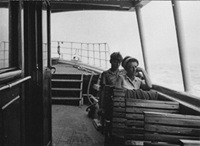
Vladimír Hučín and his mother on a boat going to the Italian island of Capri. The idyllic family vacation took place at the same time as the Soviet invasion that ended the Prague Spring.
The Simca Sedan
The extended family vacation in Western Europe in 1968 also included a stopover in Switzerland.
country: Switzerland / year:
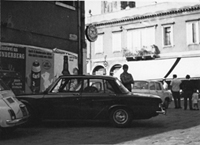
The extended family vacation in Western Europe in 1968 also included a stopover in Switzerland. While the family enjoyed the luxury of holidays and a small sedan, a Simca 1301, the Prague Spring came to a violent end in the ČSSR: a half-million soldiers from the Soviet Union, Hungary, Bulgaria and Poland marched into Czechoslovakia and forced the a change of government. In total, nearly 100 people were killed.
Bella Italia
Vladimír Hučín and his mother in front of St. Peter's Basilica in the Vatican.
country: Italy / year:
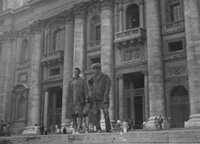
Vladimír Hučín and his mother in front of St. Peter's Basilica in the Vatican. Such an extensive tour through Italy, France and Switzerland was not a matter of course for residents of the Eastern Bloc.
Early Rebelliousness
Vladimír with his band:
country: Czechoslovakia / year:
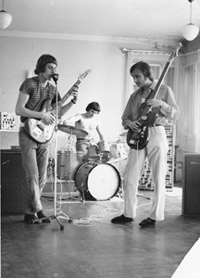
Vladimír with his band: He already didn't toe the line here; Vladimír on the guitar, Milan on the drums and Zdenek Nikl on the bass. Vladimír Hučín often also played the drums.
Contacts
1983: Miroslav Neznámy, standing at the left next to Vladimír, was part of the anti-communist resistance.
country: Czechoslovakia / year:
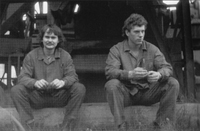
1983: Miroslav Neznámy, standing at the left next to Vladimír, was part of the anti-communist resistance. Neznámy, interrogated and pressured by the StB (Státní bezpečnost), the Czechoslovakian secret police, was forced to disclose information about the possession of illegal weapons. His confession also led to the arrest of Vladimír Hučín.
Celebrations I
On 25 February 1948, the KSČ (Communist Party of Czechoslovakia) took over power.
country: Czechoslovakia / year:
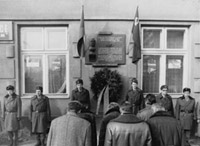
On 25 February 1948, the KSČ (Communist Party of Czechoslovakia) took over power. The official celebrations always took place in front of the Klement Gottwald Monument. The Stalinist-communist politician Klement Gottwald became the Prime Minister of Czechoslovakia in 1946, and was President from 1948 until his death in 1953 (shortly after that of Stalin). Vladimír Hučín was beaten up close to the monument in 1971 because of his "anarchist" appearance (long hair and a Led Zeppelin t-shirt).
Celebrations II
On 25 February 1948, the KSČ (Communist Party of Czechoslovakia) took over power.
country: Czechoslovakia / year:
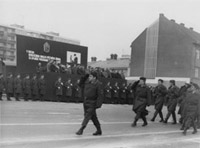
On 25 February 1948, the KSČ (Communist Party of Czechoslovakia) took over power. The official celebrations always took place in front of the Klement Gottwald Monument. The Stalinist-communist politician Klement Gottwald became the Prime Minister of Czechoslovakia in 1946, and was President from 1948 until his death in 1953 (shortly after that of Stalin). Vladimír Hučín was beaten up close to the monument in 1971 because of his "anarchist" appearance (long hair and a Led Zeppelin t-shirt).